#the chartists
Text
I listened to In Our Time on the Chartists. I thought of them as an early suffrage movement and didn't know they were so ambivalent and (possibly unintentionally) damaging to women's causes. Good listen.
0 notes
Text
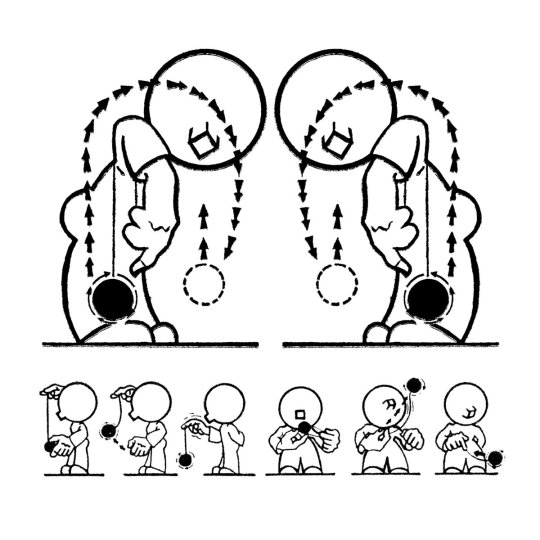
DJ Prime Cuts - Rave Master
7 notes
·
View notes
Text
It says a lot about charles smith that even though it’s been four years since his debut with literally no new canon content in that time there’s still new fan content about him p much daily
#not even just in the context of charthur ive seen a lot of brand new charles fanart in january. chartists (get it) are doing god’s work#i may have been four years late to this party but by golly i am still being fed#charles smith#rdr2#same could be said about other gang members too obvs but this ain’t about them
13 notes
·
View notes
Text


Top Image: Chartist demonstration, Kennington Common, 1848
#world inspo#paris#thatb#vintage art#chartists#victorian men#art history#victorian aesthetic#daily victorian#top hat#protest art
0 notes
Text
say what you want about the history of english proletarian organising, i do love the chartist anthem
1 note
·
View note
Text
charles davlin, ‘questions from the loom’ :
Oh, tell me ye tyrants of earth!
Ere arrive the retributive hour,
Tell the millions degraded, the butt of your mirth,
What distinguishes noble from ignoble birth?
Whence arises, what constitutes power?
Now your bark is at sea, and your mariner’s sleep,
Tho’ the dark gloom of thunder half shadows the deep.
Oh, where is your pilot, and where
Are your means, whence to buffet the storm?
Now the dark gulf beneath you behold and beware,
From the sea rifted wreck who would shoreward repair,
Can but reach by the raft of reform.
Fate frowns dark on your windward, rocks rise on your lee,
Leave the hulk of your hopes or ye founder at sea.
Ye who scoff when a nation complains,
When all mangled it bleeds at the core!
How, when millions in bondage shall sever their chains,
Bidding war’s brazen trump banish peace from you plains,
Will you silence the cannon’s dread roar?
Or behold undismayed and with pitiless eyes
Desolation’s dark columns ascend to the skies?
Shall those bastiles of famine late built
For divorce – child bereavement – and woe
Blast the land of our fathers, and cold-blooded guilt
Stay the gripe of the torch and the dagger’s dark hilt
In revenge? fell despair answers no.
For the mob on those grounds you their franchise refuse
Having nought to protect can have nothing to lose.
Yet that mob or what else you may please
They from whom you your grandeur derive;
Who the battle field brave, the deep mine and seas;
But to nurture your pride aggrandizement and ease
Could expel every drone from the hive;
Where the check of populationists find with alarm
That improvident marriages cumber the swarm.
Ye despoilers o’er earth, of your kind,
All your hope blighting prospects were vain,
Were you still, to the times so besottedly blind
As to deem that the mob whom your manacles bind,
Cannot burst the vile bondage in twain.
Inoffensive shall fall the red blade of your trust
And your cloud-cleaving citadel crumble to dust.
They whose thousands have passively died
Ere a death wound to patience was given,
As a power long insulted by impatient pride
Shall the millions to whom due redress is denied
Make appeal to their strength and to Heaven.
Is that source whence your wealth and your mightiness come,
Restitution to reap at the roll of the drum?
Beard no more sleeping vengeance with deeds;
Such as yet you might vainly deplore;
Tho’ with judgement suspended morality pleads
And with patience e’en carnal omnipotence bleeds,
Dread the burst of an Etna the more.
For the darkness of yore superseded shall be
By the effulgence of reason the light of the free.
Yes: the night of delusion is by
And the heart gladd’ning glimpses of man
Make the clouds of corruption dissolve as they fly;
Glows the life-beam of ages unborn!
When fell wars cease to crimson green earth and blue wave,
And alike shall unknown by the tyrant and slave
(northern star, 28 july 1838, 7)
#am i entering my chartist era finally#chartist poetry#charles davlin#northern star#poetry#victorian poetry#chartism tag#like... i just kinda likes this ..... but also wow mike sanders is soooo clever abt chartist poetry n marxist lit crit lol
1 note
·
View note
Text
No widely popular songs hymned companionate and egalitarian marriages, but the radical Samuel Bamford wrote tender love poems to his wife and children.
How happy may we be, my love!
How happy may we be,
If we our humble means improve,
My wife, my child, and me.
Our home shall be a turtle's nest,
Where duty, peace, and love,
Shall make its inmates truly blest,
And sorrow far remove.
And if the world upon us frown,
Still peace serene is ours;
It cannot bear the free mind down,
With all its tyrant powers:
For if they bear me far away,
And bind me with a chain,
Our nestling will beside thee stay –
Then do not, love, complain.
As an active Chartist, handloom weaver and protester at the Peterloo demonstration, Bamford made it clear that the happy marriage depended upon the couple improving their 'humble means' and braving tyranny.
"Normal Women: 900 Years of Making History" - Philippa Gregory
#book quotes#normal women#philippa gregory#nonfiction#companionate#egalitarian#marriage#samuel bamford#love poem#poetry#happiness#duty#peace#love#serenity#chartism#chartist#handloom weaver#protestor#peterloo demonstration#happy marriage#improvement#humble means#tyranny
1 note
·
View note
Text
Another woman radical, Elizabeth Pease, risked her status by supporting Chartism and said it was an 'almost outrageous stance for a lady'.
"Normal Women: 900 Years of Making History" - Philippa Gregory
#book quote#normal women#philippa gregory#nonfiction#radical#chartism#chartist#elizabeth pease#outrageous
0 notes
Text
i agree with fukuyama actually. history is over, let's call it a day and write no more on the subject.
#'miller argues that radical patriotism ended with the chartists'#'andrews dates it to the boer war'#'i argue it ended in 1914'#how about we all agree to disagree and never think about this again
0 notes
Text
one of the things i find most interesting about the protests in france at the moment is this idea that the british would supposedly never do such a thing, because it makes me think about how different this country might be if we taught history properly.
by which i mean instead of just teaching kids about kings and queens and world war two, we taught them about chartists and suffragettes (and not just the polite, middle-class suffragettes), the peterloo massacre, the poll tax riots, the peasants' revolt, the general strikes of 1842 and 1926, the bristol bus boycott, the brixton uprising... i could go on but you get the picture.
596 notes
·
View notes
Text
Socialism: Utopian and Scientific - Part 11
[ First | Prev | Table of Contents | Next ]
Then came the Continental revolutions of February and March 1848, in which the working people played such a prominent part, and, at least in Paris, put forward demands which were certainly inadmissible from the point of view of capitalist society. And then came the general reaction. First, the defeat of the Chartists on April 10, 1848; then the crushing of the Paris workingmen's insurrection in June of the same year; then the disasters of 1849 in Italy, Hungary, South Germany, and at last the victory of Louis Bonaparte over Paris, December 2, 1851. For a time, at least, the bugbear of working-class pretensions was put down, but at what cost! If the British bourgeois had been convinced before of the necessity of maintaining the common people in a religious mood, how much more must he feel that necessity after all these experiences? Regardless of the sneers of his Continental compeers, he continued to spend thousands and tens of thousands, year after year, upon the evangelization of the lower orders; not content with his own native religious machinery, he appealed to Brother Jonathan [1], the greatest organizer in existence of religion as a trade, and imported from America revivalism, Moody and Sankey, and the like; and, finally, he accepted the dangerous aid of the Salvation Army, which revives the propaganda of early Christianity, appeals to the poor as the elect, fights capitalism in a religious way, and thus fosters an element of early Christian class antagonism, which one day may become troublesome to the well-to-do people who now find the ready money for it.
It seems a law of historical development that the bourgeoisie can in no European country get hold of political power – at least for any length of time – in the same exclusive way in which the feudal aristocracy kept hold of it during the Middle Ages. Even in France, where feudalism was completely extinguished, the bourgeoisie as a whole has held full possession of the Government for very short periods only. During Louis Philippe's reign, 1830-48, a very small portion of the bourgeoisie ruled the kingdom; by far the larger part were excluded from the suffrage by the high qualification. Under the Second Republic, 1848-51, the whole bourgeoisie ruled but for three years only; their incapacity brought on the Second Empire. It is only now, in the Third Republic, that the bourgeoisie as a whole have kept possession of the helm for more than 20 years; and they are already showing lively signs of decadence. A durable reign of the bourgeoisie has been possible only in countries like America, where feudalism was unknown, and society at the very beginning started from a bourgeois basis. And even in France and America, the successors of the bourgeoisie, the working people, are already knocking at the door.
[1] "Brother Jonathan" – A sort of Anglo-Christian "Uncle Sam".
[ First | Prev | Table of Contents | Next ]
30 notes
·
View notes
Text
The fact is tho that no matter how you look at it, no matter how insufferable she is, no matter how Out Of Touch, regardless of whether she’s doing herself no favours: Eloise is right about society and just about everyone else in the show is wrong.
Like, she’s not got the full picture, she’s blinkered and her political philosophy is not very in depth or well thought out. But she’s right, and I think that’s why a lot of people watching really don’t like her because she’s breaking the illusion. All in all, the 1810s were a shit time to be alive for most people, and you can “well actually” it all you like, but the Luddite movement existed for a reason, the Chartists existed for a reason, Porto-feminist writers like Wollstonecraft and de Gouges wrote what they did for a reason.
So when you keep being reminded that it was a terrible social order for women - in a show targeted mainly towards women for escapist purposes then that character is going to come across as irritating, because she’s ruining the immersion.
Really, her attitude isn’t more anachronistic than the dresses, or the hairdos, or the diamond necklaces (men and women had been advocating women’s right to vote since before Eloise was born, lads), but it’s a problem because people are watching the show for the sweeping romances and the general regency vibe, they don’t want to think about how the regency was for most people. Which inevitably leads to some incredible projection, when watchers of a show with the central conceit of only being interested in the love lives of the top one percent of the one percent of the British aristocracy acting as though Eloise is the only privileged person on the show.
And yeah, she is better off than most of the people who exist in all of Regency Britain (though if you were to take the show as read, Britain is made up of about 70% aristocracy, 1% gentry, 5% urban bourgeoisie and 24% urban workers), but she’s the only one whose privilege is harped on out of her whole family and social circle. 99% of the speaking characters in the show come from a posher background than Beau fucking Brummell.
And! Eloise is literally just about the only main character who ever has to question her privilege! And when she is in season 2 she doesn’t throw a shitfit, she’s willing to learn! She goes out of her way to hear perspectives that she wouldn’t have heard in her social circle! But the narrative punishes her for that, and that’s because for all the criticism she gets about needing her privilege checked, they don’t actually want her to learn, they just want her to shut up and enjoy the trappings of regency decadence as much as they do.
Also - I know it’s really fashionable to rag on “pick-mes” and “Not Like Other Girls” - but actually, no, “traditional femininity” has never been socially unacceptable for women the way being GNC is, and it is in fact ruthlessly socially enforced against GNC women, even more so in the 1810s. Eloise is a teenaged girl in a society that stigmatises her for her wish for more legal autonomy, the idea that she’s somehow the villain for not being able to enjoy “feminine” hobbies without seeing them as just another element of the way women’s education is trivialised as ornamental, is farcical. “Sewing is a valuable and useful skill” so is cooking, but there’s a reason my mam, and not my dad, had home economics lessons, and that reason is still misogyny, despite the fact that it set her up better for being able to operate independently as an adult.
Idk I’m just kind of uncomfortable that in a world of rising reactionary political sentiment towards women, and this seemingly increasingly re-normalised view that women need to be wives and homemakers, people feel that the person on the show who needs to do the most introspection regarding their politics is an eighteen-year-old who is vocal about the fact that she has limited legal rights, and not any of the adult men in the show (a lot of whom probably have seats in the Upper House!!!) who never mention politics at all.
And frankly, given the shower who were Having Political Opinions in the long eighteenth century, Eloise’s brand of semi-anachronistic protofeminism is infinitely preferable to Hannah “I refuse to teach the poor how to write in my schools” More, or Edmund “don’t read my big thesis on revolutions too closely it’s definitely not all lies and junk history” Burke, or even a load of prominent members of the Bluestocking Society.
#anti bridgerton#i guess#eloise bridgerton#there’s been something of an uptick in posts being like#oh women have always been able to /influence/ politics#oh women weren’t treated incredibly terribly as a rule they were mostly fine#women had support circles and family and-#but all of this is second to the fact that they were literally legally lesser than their male couterparts#any and all political influence women managed to have#was in spite of society and the law#i think people really like to reach backwards to see the similarities between then and now#and so the fundamentally alien way that women were viewed rankles#we need women to have been fine with it or blind to it or working around it#Eloise’s impotent rage at a system she can’t hope to change as much as she’d like - if at all is irritating#but i feel that impotent rage now towards a lot of political structures#and privileged though i am compared t most people who have ever lived (i have access to disposable income and sweets)#i also can’t change much#Eloise can’t change the minds of everyone around her - no one in her family takes her seriously#but she can spoil their fun and their peace#so she does#not an uncritical Stan of either wollstonecraft or de gouges but they’re p clear that at least some women Were Not Fine with their situation
49 notes
·
View notes
Text
Welsh should stand up to attack on culture - Sheen
Actor Michael Sheen says the Welsh public must rise up and defend its cultural institutions to prevent an "unthinkable" end to the Welsh arts sector.
He listed funding cuts at Welsh National Opera, National Theatre Wales and Museum Wales as examples of "an attack on culture" in Wales.
His comments came ahead of the Welsh debut of the play Nye, in which Sheen portrays Welsh politician Aneurin Bevan, the architect of the NHS.
The Welsh government said it has had to take “extremely difficult decisions” to focus funding on core public services, including the NHS.
Sheen, from Port Talbot, said it would "an outrage... terrible" if a continuation of funding cuts meant an end for the Welsh arts sector and insisted the public would not let that happen.
“We are not going to let our country die, are we. We are not going to let it culturally die and wither on the vine," he said.
"We have to do something about it. We’re not going to sit here and let people take everything away from us.”
On taking on the role of Aneurin - or Nye - Bevan, Sheen said he felt an "emotional and passionate connection" to the Tredegar politician, but said it was also "a lot to live up to".
The play was written by Welsh playwright Time Price and is a co-production between Wales Millennium Theatre and the National Theatre in London, where it premiered in April - it will play in Cardiff from 18 May to 1 June.
It tells the story of Nye in a series of flashbacks as a morphine-induced Bevan lies in a hospital bed battling terminal stomach cancer in 1960.
Sheen said it is now time for Wales to tell its own stories - despite the squeeze on public funding.
"Walking in here yesterday, walking onto the stage I got a real excitement about the potential for this space, for plays telling Welsh stories, the story of Wales," he said.
"No one else is doing it. Where is the great play about the Chartists, the Miner’s Strike, our cultural life and history?
"We have to make sure our voices are heard. Even if the opportunities for those voices to be heard are being shut down, then we have to shout louder don't we."
The Welsh government said: “Wales’ culture, art and sports institutions are an integral part of our society and well-being, enriching our communities and inspiring future generations.
"We have acted to mitigate the full scale of the budget pressures on these sectors.
"However, we have been clear our budget is up to £700m less in real terms than when it was set in 2021.
"We have had to take extremely difficult decisions to focus funding on core public services, including the NHS.
"Based on [the UK government's] plans our budget will be lower per person in real terms in 2028/29 than it was in 2022/23.”

52 notes
·
View notes
Text
TMAGP 27 Thoughts
Spoilers, once more, below cut
I wanted to first point out that the speaker's lack of sympathy to the Chartist movement earmarks him as upper-class. The Chartists, for those unaware, were a political movement in the mid-1800s advocating the right to vote for all men (not women, this was the 1800s we're talking about here), as only landowners could vote during this time.
'Boyle's Inheritors'. Last time we met Boyle that was the Royal Society guy. And a mention of the Institute, which is indeed the Magnus Institute, though very much in its infancy, it would seem. Initially founded in 1818, our speaker appears to still be attempting to prove the existence of the supernatural at all.
Operation towards the Magnus Institute in a time we know Jonah to have lived, upper-class... could it be that the speaker is Jonah?
Further evidence: JUST READ THIS QUOTE FROM THE TRANSCRIPT!
I cannot help but feel that to understand this thing may be to finally unlock the world as yet unknown to us. And in pursuit of that, there is no cost too great.
DOES THAT SHIT NOT SOUND LIKE JONAH TO YOU?! We now could have it confirmed we have a Jonah in this timeline too!
Ooh, Gwen is getting weird emails, now.
Also, oh my god Sam and Celia fucked. They actually fucked. TMAGP pulled a fade to black on us!
.... hilltop road!!! HILL TOP ROAD?!!
Also. TREVOR MCFUCKING HERBERT MP?! TREVOR?! Well, there's something I didn't see coming. Welcome back Hunt Granddad I guess?? I wonder if Robert Montauk is still alive now. And how different is Trevor?
I believe Hilltop is also the location mentioned in the charity shop episode. Starkwall seems to have paid it a visit too... When's that episode set? 2015. It seems the institute may have had an impact there.
20 notes
·
View notes
Text

Chapter 2 - the city
Part A
Part B
Warnings: none.
----------------------------------------------------------
Anjali glanced out the window of their carriage, taking in the sights of the city around them.
“Ahh! I love the city!” she declared. “If only we could stay here all year round!” She gave a wistful sigh and X frowned, displeased with the thought.
“I think half the year is just enough for me,” she argued. “There wouldn’t be enough space for Asha.” She slumped back in her seat, exhausted by the pong journey they'd taken to get there - and also by the prospect of having to deal with all the gossip that came with London high society.
“Oh, you and your horses!” Anjali chastised her, waving her sister's complaints away. “It is rather unbecoming of a lady to enjoy riding as much as you do, Penji.”
X bit her tongue, swallowing down the first response that came to mind: what did it matter how ‘unbecoming’ she appeared to society when she’d already been promised a suitor for the Season? But she couldn’t reveal to her sister and mother the deal she’d made with their neighbour the day before. Her stomach twisted at the thought of all the engagements they’d have to attend together, all the intimate moments they’d need to fake in order to convince everyone else that they truly were in love with one another. And oh, Gabriel: what would he think of her through it all? The carriage slowed to a stop and their footman quickly appeared to help the three ladies down from their carriage.
“Gwen!” Anjali squealed, delighted to see her friend waiting for them by the door. She rushed forward to give her a hug and Gwen returned with the same uncontainable enthusiasm.
“Ahh! It is so good to see you, Anjali! And you, X!” She moved to give the older girl a hug, then curtsied before their mother in greeting. “I cannot believe that six months have gone by since we last saw one another!” Gwen’s father was the Commissioner of Police of the Metropolis and as a result, her family had always stayed in the city all year round. Her mother had passed from illness when she’d been quite young, however, so she always got a little lonely whenever her friends retired to the country seats for the winter months.
“Nor I, my friend,” X agreed, making her way over to their house. “How have you been? How is your father?”
“Oh, we have been quite all right. Just …” Gwen stopped suddenly and gestured for the two sisters to lean in a little closer to her, a conspiratorial look on her face as she studied their surroundings for any eavesdroppers. “Apparently, there is a group of radicals who have been expressing their discontent with the current system of rule. They call themselves the ‘chartists’ and have been campaigning for the reformation of the voting system!”
The girls gasped and Anjali grabbed Gwen's forearm, horrified. “My goodness! Whatever do they hope to achieve?!”
Gwen pursed her lips in thoughts, starting to get a little unsure of herself. “I am not entirely certain. My father refused to share any further details with me, so I am afraid that that is all I know of it.”
X placed a hand on Gwen’s other arm and gave her an approving nod. “Good. It wouldn’t do to get yourself mixed up with such … such fanatics!”
“Mmm. Yes, well, enough of me! How was your trip?!” She turned to face X, clasping her hands and beaming from ear to ear. “Are you excited for your first Season, X?!”
X's smile slipped slightly at the reminder of the charade she would have to put on for the next six months. For Gabe, she reminded herself, so Miguel could get the money to pay off his father’s debts, allowing them to live happily ever after. She took a deep breath and forced her lips to stretch a little wider. “Oh, definitely! I am .. ecstatic! Just imagine all the dancing and the dresses and the festivities …”
“And the men,” Anjali added, nudging her arm playfully.”
“Anjali!” X gasped, her shocked expression causing her sister and their friend to burst into laughter.
“Sorry, Penji, but I just had to tease you,” Anjali apologised. “That is what your Season is for, is it not? To meet your perfect Prince Charming and have him sweep you off your feet for your happily ever after?”
“Right,” X agreed, forcing another awkward smile onto her face. “Happily ever after.” But her happily ever after would just have to wait until next Season.
Gabe sucked in a breath when he stepped out of the carriage, grinning excitedly at his surroundings.
“Oh how I do love the city!” he declared to the world around him. He turned around and rushed back to the carriage to help his mother down from it. “Careful, mama!”
“Thank you, Gabriel,” his mother said, taking his hand and lowering herself gracefully. “I shall go check on our house. Perhaps the two of you can take a tour about the area? See the sights, get to know any new neighbours.” She shot a pointed look at Miguel and he shifted uncomfortably in position, understanding exactly what she was trying to say.
“Already?!” Gabe lamented, oblivious to the silent conversation taking place before him. “But we just got here, mama! Surely that can wait until tomorrow?”
Miguel held his mother’s gaze, silently beseeching the same - it had been a long journey and surely anyone arriving that day would have been as exhausted as they were. His mother stood her ground, unrelenting in her decision, but then Gabe perked up, waving delightedly at someone across the street. Miguel looked up and relaxed slightly when he saw their neighbour standing there in her dark blue dress, grinning brightly at his brother. Her gaze turned to him and his lips instinctively curled into that teasing smirk he only ever reserved for her. She frowned, her rosy mouth twisting into a pout as she gave him a curt nod, and Miguel found his smile stretching even wider at the sight of her irritation. He turned around when he heard his mother let out a huff and wasn’t surprised to find her disappearing into their house. She’d always do her best to not let it show in public, but Miguel knew that his mother cared not for their immigrant neighbours. Aside from fearing that their association might remind society of her own foreign background that she’d passed onto both of her sons, she knew how well-informed X was of all the goings-on that occurred in her household - there was no love lost between the two of them. Miguel sighed and followed his mother indoors, his lips twitching at the thought of the fit she’d have when she found out who he intended to pursue that Season.
Continue
#miguel x reader#miguel fanfic#atsv miguel#miguel x oc#spiderman 2099 x reader#spiderman 2099 x you#miguel spiderverse#miguel smut#miguel x you#spiderman 2099 fanfiction#miguel atsv#miguel x y/n#miguel o'hara fanfiction#miguel o'hara smut#miguel o'hara spiderverse#miguel o'hara x reader#miguel ohara x you#miguel ohara x y/n#miguel ohara smut#miguel ohara x reader#miguel ohara x oc#miguel ohara fluff#miguel ohara fic#miguel ohara fanfiction#miguel o'hara x you#miguel o'hara x y/n#miguel o'hara fluff#atsv fanfiction#atsv au#spiderman 2099 spiderverse
27 notes
·
View notes
Text
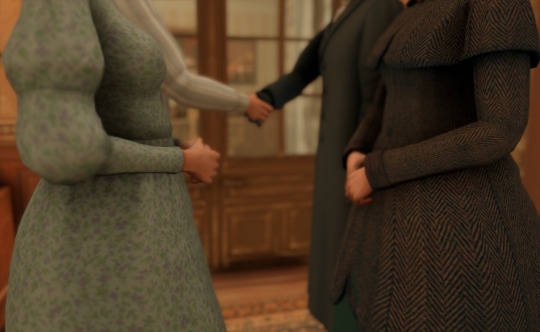
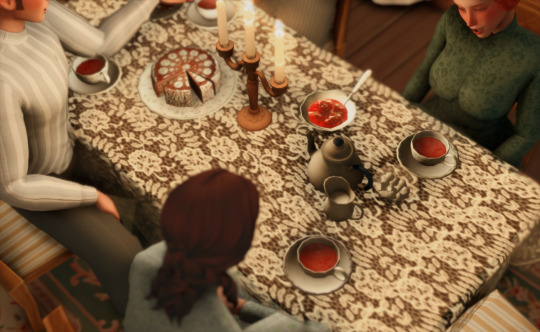

The days passed swiftly, each one blending seamlessly into the next as winter surged forward with unyielding determination. Finally, the anticipated day arrived when Edwin and Wilhelmina convened with Mary Elizabeth and her betrothed.
As Thomas ventured outdoors with Josephine, their laughter echoing through the crisp winter air, Wilhelmina gracefully ushered the children inside upon Mary Elizabeth's arrival with Edmund. A warm exchange of pleasantries ensued, with Edwin warmly extending his hand in greeting, though Edmund's demeanor remained somewhat reserved.
Seated around the table, Wilhelmina meticulously poured steaming cups of tea, the fragrant aroma filling the air, accompanied by a freshly baked cake she had lovingly prepared earlier, along with homemade jam. Edmund expressed heartfelt gratitude for their hospitality, acknowledging the arduous journey and the unwavering support they had provided to Mary Elizabeth.
Engaged in lively conversation, the four of them delved into the intricacies of how Mary Elizabeth and Edmund had crossed paths, each anecdote revealing a new layer of their shared history. It transpired that Edmund hailed from a nearby village, relocating to Birmingham over a decade ago before securing a marginally better-paying position in London less than a year prior. It was in the bustling capital where their paths serendipitously converged, marking the inception of Edmund's courtship of Mary Elizabeth.
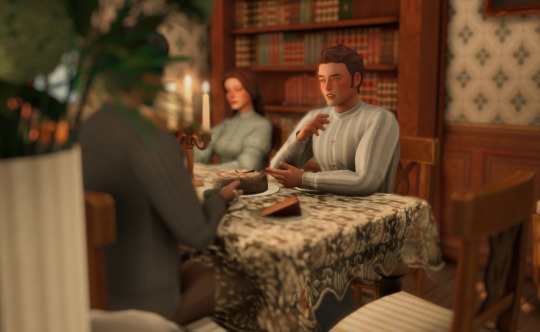
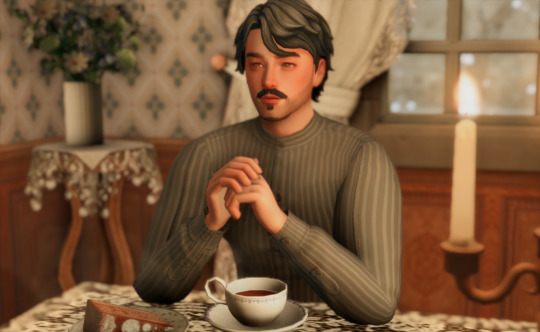

As the afternoon gradually progressed, the conversation revolved around London and its situation. Although they knew many people moved to the city to work in factories, they hadn't personally known anyone until now. For the past year, they had been reading in the newspaper about worker protests demanding better labor conditions. And most of the time, the newspapers branded the protesters as violent and greedy.
"Well, the newspapers don't always tell the truth. In the city, the hours are inhumane, and most of us don't have safety measures." commented Edmund, setting his tea cup on the saucer. Wilhelmina and Mary Elizabeth exchanged glances as Edmund spoke. "And well… there are many children, most very young, working in factories and construction. It's not the same as them working here, in the village." he continued.
Edwin nodded. "Perhaps you'd be better off here, wouldn't you? You still have your house." he said, looking at Mary Elizabeth. "You could try to find work around here, maybe in the railway." he suggested to Edmund, but he shook his head. "I have a good position in London, and I might be promoted to plant manager. And if that happens, we could afford to give Josephine and any future children a better life."
During those years, there were many riots and protests, especially in the big cities, where the Chartist Movement demanded, among other things, labor improvements. Although despite the poor working conditions, many people preferred to go to the city than live in the villages, praying for good harvests and hoping to earn a few pennies.
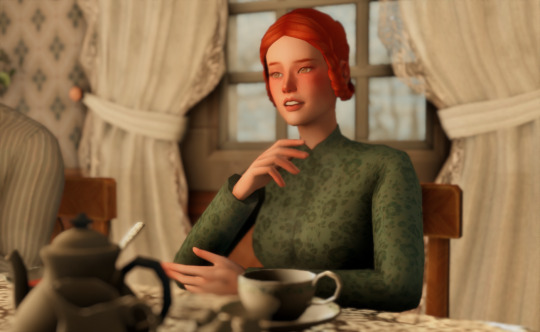
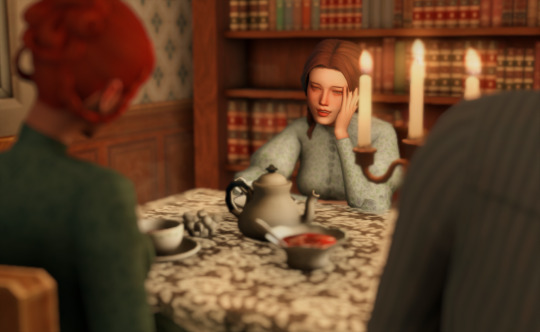

"Ah, don't worry, I'm sure we'll do just fine in the city." reassured Mary Elizabeth in her usual calm and soothing voice. "By the way, they haven't gone too far, have they?" she inquired, her gaze wandering towards the window, where Thomas and Josephine had disappeared into the snowy landscape, their laughter faintly echoing in the distance.
"Don't fret, dear, I made sure to tell Thomas not to stray too far." Wilhelmina responded, her tone filled with reassurance as she glanced out the window. "It's a bit melancholic, isn't it? The thought of them not seeing each other anymore. They've grown so close... It's hard to believe how hesitant they were with each other at the start."
Mary Elizabeth's lips curled into a fond smile. "You know, Josephine confided in me not too long ago. She expressed a desire to marry him." she revealed, a soft chuckle escaping her lips. Wilhelmina nodded knowingly at Mary Elizabeth's words, as she had already noticed how Josephine looked at Thomas.
"Oh, my Thomas is so clueless about these things..." Wilhelmina remarked with a gentle sigh, resting her chin on her hand as she leaned in closer. "But can you imagine if they do end up tying the knot someday?" A shared moment of laughter ensued between the two women, drawing the attention of Edwin and Edmund, who had been engrossed in their own conversation.
#ts4#sims 4#ts4 legacy#sims 4 legacy#ts4 decades challenge#sims 4 decades challenge#ts4 historical#1830s#the langley legacy#wilhelmina langley#edwin langley#mary elizabeth aldridge
20 notes
·
View notes